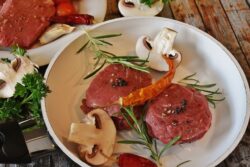Table of Contents
What happens if you eat too much carbs?
It is said that carbs are the food of love. There’s no carbs in fruits, but what happens if you eat too much carbs?
You can find carbs in all kinds of foods – breads, pasta, sweets. The carbs are grouped into two main types – simple carbs and complex carbs.
Simple carbs are broken down by your body to be used as energy quickly. The carbs turn into glucose, which can be used by your brain for immediate focus, or by your muscles to help you workout.
Simple carbs are carbs that are found in fruits and vegetables. These carbs can be broken down very easily into glucose, which is the body’s natural source of fuel.
Complex carbs , however, take some more time for your body to break down. They are carbs that come from grains and whole-wheat products. These carbs aren’t turned into glucose as quickly because they need some extra processing.
It’s best to stick to simple carbs rather than complex carbs when you want energy just before an event or workout session, because the carbs will provide your body with the quick energy it needs.
Complex carbs are better when you want carbs for extended periods of time such as in between meals or overnight, because complex carbs give you a slow and steady release of glucose over a longer period of time.
Most carbs are broken down into glucose, but there are some carbs that don’t get broken down and they pass through your body undigested.
Bad carbs that aren’t broken down into glucose don’t provide many nutrients to your body, but carbs that remain undigested in the large intestine for a long time ferment and can cause bloating, cramping and diarrhea.
What happens if you eat too little carbohydrate sources?
Carbohydrates are the body’s preferred macronutrient to use for energy. The problem is that carbs tend to be very good at raising blood sugar levels, which raises insulin levels in an attempt to store this excess glucose as fat.
The solution would seem obvious: reduce carbs and slim down. But what happens when you eat too few carbs?
The answer isn’t simple. The only way to find out is by putting carbs on the menu – or not!
A low carb diet can be really helpful for weight loss. Some people are carb-sensitive, meaning that their metabolism works better with fewer carbs, so cutting carbs may bring fat loss results more effectively than other diets.
If carbs are so good at spiking insulin levels, what happens when you cut carbs?
Carbs themselves don’t actually have an effect on insulin secretion. It’s the foods those carbs come from that have a dramatic impact on blood sugar and insulin levels.
The glycemic index of a food is one indicator of how carbohydrate-rich it will be, but carbs are carbs.
What happens if you don’t eat enough carbs bodybuilding?
What happens if you don’t eat enough carbohydrates as a bodybuilder? First and foremost your pancreas will secrete glucagon.
Glucagon is a hormone that gets secreted by the pancreas when blood sugar levels start to drop, and it acts to release stored sugar from the liver.
In other words, your body will start tearing apart carbs to create energy so you can remain active.
What happens when you don’t get enough carbs in your diet?
Carbs are in just about everything. Breads, rice, crackers, cereal, chips, etc.…
If carbs are not eaten, then the body will start to use fats and proteins to replace carbs.
This happens because carbs are the easiest nutrient in the body for it to process. So carbs are usually burned first.
Many carbs are white, which is why some people who eat carbs will have a whiter looking skin.
Shorter Answer
When carbs are not eaten for an extended period of time the body will begin to use protein and fat to replace carbs, because carbs are usually processed first by the body.
If carbs aren’t consumed long enough the body will start to break down it’s own fat and tissue in order to produce carbs.
– carbs are in most foods – carbs are usually used first by the body – when carbs are not eaten, the body uses fat and protein instead
– carbs were replaced with fat and protein in the absence of carbs – carbs looked whiter in the absence of carbs – carbs are usually burned first by the body
– carbs are processed first by the body – carbs found in most foods
– when carbs aren’t eaten for an extended period of time, the body starts to breakdown it’s own fat and tissue to produce carbs.
